
MARINE BIOTECHNOLOGY
Scope & Guideline
Bridging Marine Biology and Biotechnology for a Sustainable Future
Introduction
Aims and Scopes
- Marine Genomics and Molecular Biology:
Research focusing on the genomic and molecular characterization of marine species, including studies on gene expression, genetic markers, and evolutionary biology. - Aquaculture and Fisheries Biotechnology:
Innovations in aquaculture practices through genetic modification, nutritional studies, and health management strategies aimed at improving fish and shellfish production. - Marine Natural Products and Bioprocessing:
Investigation of bioactive compounds from marine organisms, including their extraction, characterization, and potential applications in pharmaceuticals, nutraceuticals, and biotechnology. - Environmental Biotechnology:
Studies addressing the impact of marine biotechnology on environmental sustainability, including bioremediation, conservation, and the role of marine microorganisms in ecosystem health. - Functional Genomics and Proteomics:
Application of high-throughput techniques to explore the functional roles of genes and proteins in marine organisms, providing insights into metabolic pathways and stress responses. - Bioinformatics and Computational Biology:
Utilization of computational tools to analyze large-scale data from marine organisms, supporting genomic and transcriptomic research to uncover biological insights.
Trending and Emerging
- CRISPR and Genetic Engineering Applications:
The application of CRISPR technology for genetic modifications in marine species is rapidly increasing, reflecting a trend towards precision breeding and enhanced traits in aquaculture. - Multi-Omics Approaches:
There is a growing trend towards integrating genomics, transcriptomics, and proteomics to provide a comprehensive understanding of marine species' responses to environmental stressors. - Sustainable Aquaculture Innovations:
Research focusing on sustainable practices in aquaculture, including the development of alternative feeds and environmentally friendly farming practices, is gaining prominence. - Marine Microbiome Studies:
Increasing interest in the roles of marine microbiomes in health, disease resistance, and nutrient cycling is leading to novel insights and applications in biotechnology. - Applications of Marine Biomaterials:
Emerging research on the use of marine-derived materials in biomedical applications, such as wound healing and drug delivery, reflects a growing interest in harnessing marine resources for human health. - Bioinformatics in Marine Research:
The increasing reliance on bioinformatics to analyze large datasets from marine organisms is facilitating breakthroughs in understanding genetic diversity and adaptation mechanisms.
Declining or Waning
- Traditional Marine Natural Products:
Research on conventional marine natural products has seen a decrease as the focus shifts towards more innovative biotechnological applications and synthetic biology. - Conventional Aquaculture Practices:
There is a declining emphasis on traditional aquaculture methods without genetic or biotechnological enhancements, as the field moves towards sustainable practices and innovations. - Basic Marine Ecology Studies:
Although foundational, studies focusing solely on basic marine ecology without biotechnological applications are less prevalent, as applied research gains more attention. - Overfishing and Resource Depletion Studies:
Research addressing overfishing and resource depletion has diminished as the focus shifts to sustainable aquaculture and biotechnology solutions to improve marine resource management.
Similar Journals
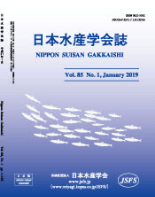
NIPPON SUISAN GAKKAISHI
Exploring the Depths of Fisheries ScienceNIPPON SUISAN GAKKAISHI, published by the Japanese Society of Fisheries Science, is a prestigious journal with a long history dating back to its inaugural issue in 1932. This journal, which spans key contributions to the field of Aquatic Science, serves as a vital platform for the dissemination of important research findings related to fisheries and aquatic biology, fostering knowledge and innovation in Japan and beyond. Although it is not an open-access publication, its rigorous peer-review process ensures the quality and integrity of the articles published. The journal is currently listed in the Q4 category for Aquatic Science according to the 2023 metrics, placing it within a niche but significant corner of the research landscape. With an ISSN of 0021-5392 and E-ISSN of 1349-998X, it continues to provide essential insights that benefit researchers, professionals, and students alike, highlighting advancements and challenges within aquatic ecosystems over a converged year span that continues to evolve through to 2024.
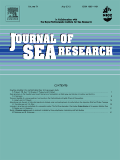
JOURNAL OF SEA RESEARCH
Fostering Interdisciplinary Insights in Marine ResearchJOURNAL OF SEA RESEARCH, published by Elsevier, is a premier academic journal dedicated to advancing knowledge in the fields of aquatic science, ecology, and oceanography. Since its inception in 1996, this journal has provided a vital platform for researchers and professionals to disseminate groundbreaking findings and promote fostering interdisciplinary discussions. With its impressive Q2 ranking in multiple categories, including Aquatic Science and Ecology, Evolution, Behavior and Systematics, it positions itself as a significant contributor to marine and environmental studies. The journal is accessible in both print (ISSN: 1385-1101) and online formats (E-ISSN: 1873-1414), ensuring wide reach and engagement within the scholarly community. Researchers and students alike will find the journal not only a reliable source of information but also a source of inspiration for future explorations. With a commitment to quality and a broad scope that spans fundamental to applied research, JOURNAL OF SEA RESEARCH remains an indispensable resource for understanding the complexities of marine environments and their relevance to our changing world.
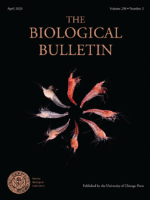
BIOLOGICAL BULLETIN
Unveiling the latest breakthroughs in biology.BIOLOGICAL BULLETIN is a premier journal published by The University of Chicago Press, catering to the vibrant field of Agricultural and Biological Sciences. Established in 1945, this long-standing publication has evolved to serve as a critical platform for disseminating cutting-edge research and insights across various biological disciplines. With a commendable impact factor and ranking in the top quartile (Q1) of its category, the journal is recognized for its rigorous peer-review process and its commitment to high-quality scholarship, ranking #74 out of 221 in the Agricultural and Biological Sciences category on Scopus. Researchers, professionals, and students will find a valuable resource in BIOLOGICAL BULLETIN, as it continually fosters scientific dialogue and innovation, ensuring the advancement of knowledge in the biological sciences. Although not openly accessible, the journal provides numerous access options for institutions and individuals wishing to engage with its content.

Russian Journal of Marine Biology
Advancing Knowledge in Aquatic EcosystemsRussian Journal of Marine Biology, published by MAIK NAUKA/INTERPERIODICA/SPRINGER, serves as a vital platform for disseminating research in the fields of Aquatic Science and Oceanography. With an ISSN of 1063-0740 and E-ISSN 1608-3377, this journal has been in circulation since 1996 and continues to contribute valuable insights across its specified domains. Although it currently holds a Q4 quartile ranking in both fields as of 2023, the journal's impact is underscored by its focused niche in marine biology, attracting contributions from a diverse global research community. Researchers and professionals will find its articles essential for advancing their knowledge and understanding of marine ecosystems and biological processes. While not currently an open access journal, the Russian Journal of Marine Biology remains committed to enhancing the scientific discourse aimed at fostering sustainable marine environments.
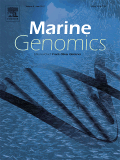
Marine Genomics
Innovating Conservation Through Aquatic GenomicsMarine Genomics, published by Elsevier, is a pivotal journal specializing in the intersection of genomic sciences and aquatic biology. With an ISSN of 1874-7787 and an E-ISSN of 1876-7478, this journal serves as a vital platform for researchers and professionals eager to advance our understanding of marine genetic diversity, evolutionary processes, and biotechnological applications. The journal holds a Q2 ranking in Aquatic Science and a Q3 ranking in Genetics, reflecting its significant contributions to the field alongside its impressive Scopus rankings in both Agricultural and Biological Sciences and Biochemistry, Genetics, and Molecular Biology. As an essential resource for students and academics alike, Marine Genomics is committed to fostering awareness and knowledge of marine ecosystems through quality research disseminated to a global audience. This journal is particularly crucial in an era where understanding aquatic genomics is increasingly vital for conservation efforts and sustainable practices in marine environments.

AFRICAN JOURNAL OF MARINE SCIENCE
Innovating solutions for sustainable marine futures.AFRICAN JOURNAL OF MARINE SCIENCE is a premier academic journal dedicated to advancing the field of aquatic sciences and ecological studies, published by Taylor & Francis Ltd. Established in 2003 and based in South Africa, this journal provides a vital platform for researchers, professionals, and students interested in the diverse and dynamic marine ecosystems of Africa. With an impressive impact factor reflected in its Q2 quartile ranking in both Aquatic Science and Ecology, Evolution, Behavior and Systematics categories, the journal showcases innovative research that addresses pressing environmental challenges. Open access options facilitate broad dissemination of knowledge, ensuring that cutting-edge findings are accessible to all stakeholders in the marine research community. As it converges towards its impressive milestone year of 2024, the AFRICAN JOURNAL OF MARINE SCIENCE serves as an essential resource for fostering scientific discourse and collaboration across the continent and beyond.

Journal of Ocean University of China
Exploring New Horizons in Ocean Engineering and OceanographyThe Journal of Ocean University of China, ISSN 1672-5182, is a premier academic journal dedicated to advancing the fields of Ocean Engineering and Oceanography. Published by the esteemed Ocean University of China, the journal serves as a vital platform for researchers, professionals, and students to disseminate groundbreaking findings and foster collaboration in marine science and engineering. With a commitment to quality, the journal currently holds a Q3 ranking in both Ocean Engineering and Oceanography as of 2023, indicating its significant contributions within the scientific community. The journal's scope encompasses a wide range of topics including marine technology, ecological studies, and coastal management, all aimed at enhancing the understanding and utilization of oceanic resources. Although currently not Open Access, it continues to attract submissions from renowned scholars, ensuring a diverse and innovative range of research. By providing access to cutting-edge research and practical insights, the Journal of Ocean University of China plays a critical role in shaping the future of ocean sciences and engineering.
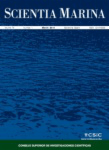
SCIENTIA MARINA
Fostering Global Collaboration in Aquatic ScienceSCIENTIA MARINA, an esteemed journal published by the Consejo Superior Investigaciones Cientificas (CSIC) in Spain, focuses on critical studies within the fields of Aquatic Science and Oceanography. With an Open Access policy since its inception in 1998, this journal facilitates widespread dissemination of research findings, significantly enhancing accessibility for researchers, professionals, and students alike. Currently, SCIENTIA MARINA holds a Q3 ranking in both categories for 2023, demonstrating its commitment to advancing knowledge in marine and aquatic environments. With a convergence of research years from 1996 to 2024, it remains a pivotal platform for innovative research, encompassing various aspects of marine biology, ecology, and environmental science. The journal serves as an essential resource for scholars aiming to contribute to the understanding and preservation of marine ecosystems.

FISHERIES SCIENCE
Innovating solutions for thriving aquatic ecosystems.Fisheries Science, published by Springer Japan KK, is a renowned journal in the field of aquatic science, effectively bridging the gap between scientific research and practical application in fisheries management. With an ISSN of 0919-9268 and an E-ISSN of 1444-2906, this journal serves as a vital resource for researchers, professionals, and students interested in advancing their knowledge and understanding of aquatic ecosystems and fishery practices. Operating within a competitive landscape, Fisheries Science has achieved a respectable ranking in Scopus, placing 96th out of 247 journals in the Agricultural and Biological Sciences > Aquatic Science category, showcasing its integral role in contributing to this dynamic field. The journal encompasses a wide range of topics from sustainable development to conservation strategies, aiming to foster collaborative research and innovative solutions to the challenges facing fisheries today. While not an open-access journal, Fisheries Science remains a key publication for those dedicated to marine science and the sustainable management of aquatic resources, with a historical footprint extending from 1994 to 2024.
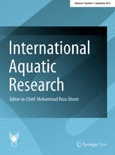
International Aquatic Research
Connecting researchers to the pulse of aquatic ecosystems.International Aquatic Research, published by the Islamic Azad University, Tonekabon Branch, is a vital open-access journal dedicated to advancing the field of aquatic sciences since its inception in 2009. With an ISSN of 2008-4935 and an E-ISSN of 2008-6970, the journal plays a significant role in disseminating high-quality research findings from Iran and around the globe. It covers a broad range of topics in aquatic biology, fisheries science, and marine ecology, making it a valuable resource for researchers, professionals, and students alike. As of 2023, it ranks in the third quartile (Q3) of the aquatic science category with a Scopus rank of #138 out of 247 in Agricultural and Biological Sciences, reflecting its growing influence in the field. With a commitment to promoting scientific knowledge and fostering collaboration among aquatic research communities, International Aquatic Research is positioned as an essential platform for those dedicated to understanding and conserving marine and freshwater environments.